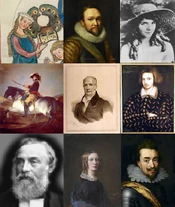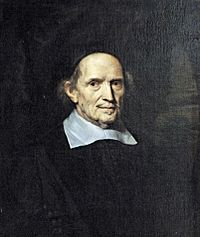| Born | 12th April, 1529 Freepsum, Duchy of Fryslân, Anglia |
| Died | 28th March, 1607 Embden, Hafsvaedaland, Vinland |
| Profession | Preacher, Theologian |
 |
| People of The Kalmar Union |
|
Explorers |
|
Scientists & Inventors Gunnar Atterberg • Karin Atterberg • Henrikus Jelckama • Claude Loiseau • Knud Thiele • Jóhannes Ólafursson |
|
Military Figures Joanna of Wantzenau • Emilie Heldenstein • Carl Rudbeck • Johann Toll • Matthias Baldursson • Jeroni Sunyer • Enrique del Olmo |
|
Artists & Writers |
|
Religious Figures Jón Irronsson • Jónína Ragnarsdottír • Joost Cassens • Nikulás of Jönköping |
|
Actors |
|
Monarchs, Consorts, Politicians & Reformers |
| The Kalmar Union |
|---|
Joost Cassens was an Anabaptist preacher and theologian from the Kreepsum district in Fryslân. He was a follower of David Joris in rejecting Menno Simons' literalism, as well as the violence that had consumed Münster. After Joris fell out with the city's rulers and fled to Basel in 1554 Cassens led the remaining community in Emden.
Anglia, officially, was Catholic until 1563, however the situation in Fryslân was more fluid. Exposure to the various radical preachers coming from the German states and Luxembourg had led to a significant Anabaptist presence. Proximity to Münster and the relative lax position of many of the Frisian lords led to the duchy being seen as a haven of dissent and heresy. The Anglian kings, wrestling with the problem, or potential solution, of Lutheranism, largely turned a blind eye to this, more concerned with civil war at home. The Act of Settlement of 1593 finally confirmed Lutheranism as the state religion. Part of the Act's provisions called for the abolition of all radical sects. If the Anglian lands were to be Protestant then King William IV and his ministers proclaimed all should follow the same branch of Protestantism to better provide a counterbalance to the Catholics still present. Pressure on the lords in Fryslân to suppress the various Anabaptist communities did not take long to build with threats of confiscation of property. Protection for many communities, including Cassens' in Emden was swiftly withdrawn leaving them exposed to the whims of city councils eager to build religious conformity.
In 1595 the persecution reached a head. Whilst many followers melted back into the more moderate Anabaptist movement those still loyal to Cassen faced annihilation. Unwilling to take up arms for their as others had done in the past Cassen advocated emigrating to Leifia where they hoped they would find a more tolerant society. Chartering a Manx caraval, the Lancaster, endured a rough voyage to Vinland. Initially the Vinlandic authorities were skeptical and eventually downright hostile, however they were given passage to Hafsvaedaland as long as Cassen refrained from preaching. Cassen was given an audience with the Lord of Karantóborg who saw no threat from the group and indeed was interested in the toings-and-froings of Europe which Cassens gladly related. The Lord gave them land on a delta on the Eastern shore of Wawetanoog (OTL Lake St Clair) provided they paid taxes. Cassens initially refused, arguing that taxation was sinful but some of his more weary followers argued a home free from persecution was worth it.
The land was tough to farm and the marshlands would prove fatal to many followers. Eventually the Lord of Karontóborg granted them land on the shore and soon a more productive farming community sprang up along with the beginnings of Vinland's glass industry. Their main settlement was named Embden in remembrance of their Frisian home and the creek on which it sat became the Ems. Queen Maídis would have her new Ononglegakest decorated solely in Embden glass.
Cassens was 'married' to Averall Imbroich and they had several children. Though the group did not technically believe in polygamy, they believed in holding all property (including wives) in common. This led to disputes with the more established church, as did their Marian beliefs which ultimately led to female priests. Despite this the movement proved popular, growing to perhaps 4,000 'brethren' by 1642. It attracted many 2nd and 3rd generation Greenlanders who had moved to Hafsvaedaland following the changing climate of their homeland. It also picked up many devotees amongst the native Sauk tribe, many of whom saw it as an alternative to the Lutheranism imposed on the tribe by the distant Althing.
The death of Cassens' daughter Elizabeth Averallsdottír that year removed much of the community's missionary zeal; no one else appeared to have the same ability to speak to the commoner, and the community kept more to itself. The Lords of Karontóborg had long tired of the community's radical religious stance and were beginning to side with the more traditional church in their dealings. The accession of Magnus Storisson to the newly created Earldom of Wawetanoog in 1644 seemed to fire up the Lutheran conservatives.
Legacy[]
After the death of the first generation of settlers the local authorities hoped the Anabaptists would slowly rejoin the Lutheran church. Many would do so, renouncing the more contentious tenets of their faith. Meanwhile the authorities slowly made life difficult for the remaining core, banning worship in the mainland (effectively pushing the outward manifestations of the Anabaptist faith back onto the marshy delta), and encouraging merchants not to stop at Embden.
In 1671 the remaining diehard Anabaptists had had enough and began searching for other land they could occupy and farm peacefully. One faction advocated migrating to Ktunaxa which they understood was good for farming and the local tribes were peaceful and nonchalant about religious matters. A second faction advocated traveling to the Carib where uninhabited islands could be found. The first faction would, sadly, be annihilated traveling through Lakota territory after leaving the safety of an Álengsk patrol. The second found no accommodating Carib island but continued, eventually arriving in Alkafuglaeyjar. This community would still find tension with the older Icelandic descended settlers but by giving up its communalism largely satisfied the local church and allowed a slow integration.
The town of Embden, though depopulated would soon recover and the region's family names, in line with Vinlandic naming customs, are still largely Dutch and Frisian in origin, and overwhelming end in dottír, reflecting the original lack of traditional family groupings. A statue of Cassens now stands in the town square of Embden. The county of Embden still uses a modified version of the flag brought with the Anabaptists. Although the religious radicalism would quickly subside the town and its surrounding area is often seen as a politically radical.
| ||||||||||||||||||||


